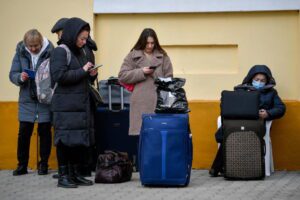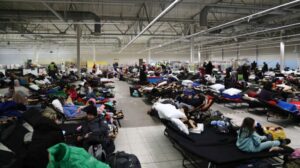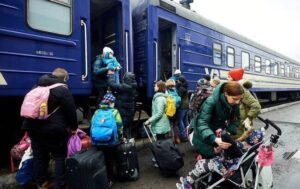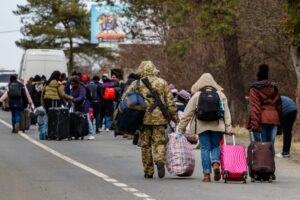
Nearly 43,800 refugees from Ukraine have been registered in Lithuania, 18,200 of them are minors, data from the Lithuanian Statistics Department released on Tuesday show.
Over the past 24 hours, 857 refugees have been registered in Lithuania, of which 334 are minors, including 87 children under six years of age. The weekly average daily rate of arrivals from Ukraine, according to the latest data, is 489 people.
Approximately a third of the Ukrainians who arrived were registered at the Vilnius registration center, about 6,000 – at the Kaunas center. Almost 4,900 refugees who arrived in Lithuania are children under the age of six, 13,400 are between the ages of 6 and 18. More than 1.9 thousand are people over the age of 65.
Most of the arrivals applied for a temporary residence permit for humanitarian reasons. Most of the arrivals are women and children.

Since February 24, 2.5 million citizens of Ukraine have crossed the Polish border, according to the Polish Border Guard Service.
“Yesterday, on April 5, 21,000 travelers were registered, which is 13% more than the day before (18,500). Today, 4,700 had been issued by 07:00 with an increase of 23%,” the message posted on Twitter says.
Since February 24, 485,000 people have left Poland for Ukraine.

The vast majority (79.2%) of refugees from Ukraine intend to return to their homeland after the end of the war, and only 10.9% do not plan to return, according to the results of a survey conducted by the Sociological Service of the Razumkov Center at checkpoints in the Transcarpathian region from March 15 to April 1.
During the survey, 101 respondents over 16 years old were interviewed, who were traveling from Ukraine on foot or by road. 89.1% are sure that Ukraine will win this war, only 1% are sure that it will lose, the rest found it difficult to answer.
83.2% of refugees are women. 63.4% travel with their children and only 12.9% on their own.
36.6% – leaving the country at the age of 30-39, 25.7% – 40-49 years old, 18.8% – 16-29 years old, 10.9% – over 60 years old and 7.9% at the age of 50 -59 years old.
The relative majority of refugees are from Kyiv and Kharkov regions (18.8% each), slightly less from Kiev (11.9%), Donetsk (7.9%), Zaporozhye (6.9%), Mykolaiv, Odessa, Kherson ( by 5%) regions. No one left Volyn, Lvov, Khmelnytsky, Ivano-Frankivsk, Chernivtsi, Ternopil regions. 55.4% stated that they left the settlement where the hostilities took place, 12.9% – that the hostilities took place nearby, 9.9% – that there were no hostilities, but their locality was bombarded or shelled, 13.9 % – that this happened in a neighboring settlement, and only 7.9 noted that there were no hostilities and shooting either in their settlement or nearby.
26.7% reported that they received assistance from government agencies, 53.5% – from volunteers, 8.9% – from religious organizations, 6.9% – from enterprises (including at the place of work), 40, 6% – from relatives and friends, 44.6% – from unfamiliar fellow citizens, only 20.8% received no help at all. 63.4% of refugees said that the language of communication at home is Russian (only 30.7% – Ukrainian), but only 21.8% called Russian their native language (Ukrainian 65.3%, 4% named another language).

The Council today adopted legislative amendments making it possible for member states to redirect resources from cohesion policy funds and the Fund for European Aid for the Most Deprived (FEAD) to assist the refugees escaping the Russian military aggression against Ukraine. The total amount of assistance will be EUR 17 billion.
“The swift amendment of the legislation on EU funds is a clear statement of the EU’s continued solidarity with the refugees from Ukraine and with the member states hosting them, in particular those sharing borders with Ukraine, ” a communique of the European Council, distributed on Monday, reads.
“This is an important step in ensuring member states have sufficient resources to meet the growing needs for housing, education and healthcare, ” the press release reads.

Almost 500,000 places have been organized in the western regions of Ukraine to accommodate refugees from other regions, 150,000 places are still free, Prime Minister of Ukraine Denys Shmyhal said.
According to him, military administrations have already allocated ten land plots for the construction of temporary housing.
“With the help of the government, local authorities and with the support of our international partners, we will build temporary camps from modular houses. It will be possible to live in them for a year or two, during the hostilities and for the period of restoration of lost housing,” he said in an interview with Interfax -Ukraine.
The Prime Minister noted that 3.7 million people have already left the territory of Ukraine, but 400,000 of them have returned.
“Some are returning to defend Ukraine. Others saw that the Armed Forces stopped the aggressor, there was a certain stabilization of the front. That is, the returning process has begun. The government, in turn, began to develop a program aimed at making it easier for people to return home. People need housing, funds, work,” Shmyhal said.
He recalled that internally displaced persons can receive monthly assistance for living in the amount of UAH 2,000, while persons with disabilities and children can get UAH 3,000. In addition, employers receive UAH 6,500 for working employees.
In addition, persons who host refugees free of charge receive compensation for utilities under the Pryhystok program.

The United States is ready to accept 100,000 refugees from Ukraine, U.S. President Joe Biden said.
Many Ukrainian refugees want to stay in Europe, closer to home, but we also welcome 100,000 Ukrainians to the U.S. with a focus on family reunification, Biden said at a press conference in Brussels on Thursday.